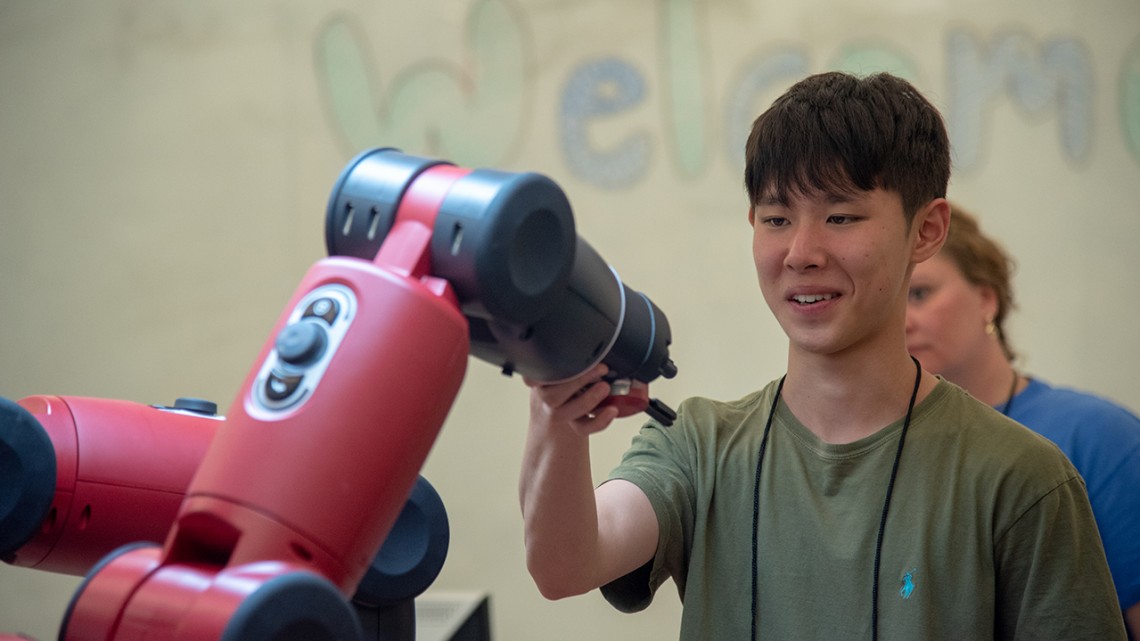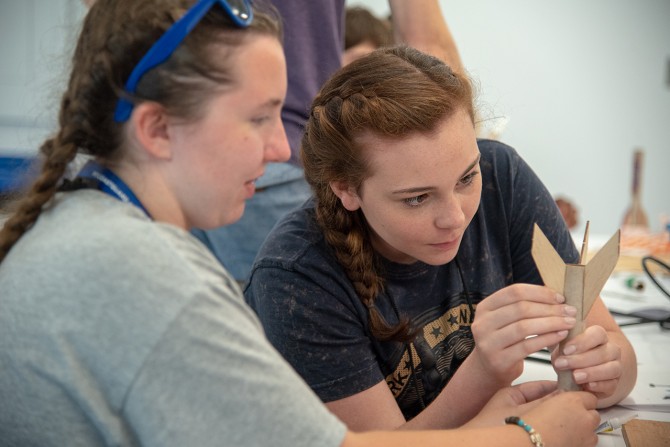
A participant at the 2018 4-H Career Explorations learns to program Baxter, a robot in Cornell’s Department of Computer Science.
Career Explorations puts future in 4-H'ers hands
By Stephen D’Angelo
More than 500 middle and high school students from across New York gathered at Cornell’s Ithaca campus June 26-28 to participate in life-changing workshops taught by Cornell faculty, staff and graduate students during the annual 4-H Career Explorations conference.
“The goals of 4-H Career Explorations are for young people across New York state to have the opportunity to come to Cornell and learn about themselves, their peers, campus life and careers,” said Alexa Maille, extension associate with Cornell Cooperative Extension and the Bronfenbrenner Center for Translational Research. “We hope they have the opportunity to try out new identities and possibilities for their futures and discover pathways and people who can help them pursue their individual future goals.”
Dozens of scholarships were made available through the New York State 4-H Foundation and Cornell University.
The conference’s 27 programs connected youth to academic fields including engineering, animal science, astronomy, environmental science, food science, nanotechnology and human development, facilitated by the Colleges of Human Ecology, Agriculture and Life Sciences, Arts and Sciences, and Engineering, the Faculty of Computing and Information Science, and the Herbert F. Johnson Museum of Art.
New this year was “Dress Code,” a program that allowed participants to explore the integration of fashion and computer science.
“From the jacquard loom, known as the first computer, to the current use of algorithm-driven design and fashion management practices, technology and fashion go hand in hand,” said program leader Katherine Greder, a doctoral student in the field of fiber science and apparel design.
Students made pocket looms that they used to weave binary code into small samplers, visited the Cornell Costume and Textile Collection to see examples of old punch cards and intricate jacquard woven fabric, and learned about the connection between 3D body scanning and coding.
“The reason we wanted to present this more tech-focused approach to fashion is because the industry is rapidly changing,” Greder said. “Many of the future jobs in the fashion industry will require a proficient command of computer-aided design and an understanding of coding.”
The Women in Science program, part of Career Explorations for 17 years, explored how social science can be used to investigate the question of why fewer women than men are found in science, technology, engineering and math (STEM) careers, and exposed students to social science fields such as human development and psychology.
“One of the focuses of the program is how diverse science is; it’s not just chemistry or engineering,” said Caisa Royer, the Women in Science program leader and a graduate student in the dual J.D./Ph.D. program in developmental psychology and law. “For me, the primary goal is for students to start thinking differently about both science and their opportunity to become scientists, but also to help students get excited about college and the types of opportunities they will have in the future.”
Graduate students discussed their research, experiences in the academic world and love of their specific scientific studies, as well as potential careers in science disciplines and what types of credentials are necessary to pursue these careers.
Wendy Williams, professor of human development and academic lead of the Women in Science program, said: “By focusing on social science questions and methods, my program shows students that not all scientists work in wet labs. Some scientists study human behavior, motivation, goals and attitudes, and answer questions about how human behavior can be understood and modified.
“By attending Career Explorations and spending time on the Cornell campus, these students get a feel for college life, and it is demystified for them,” Williams said. “If my program reaches young women and men and encourages them to apply to college, it will have done its job.”
The hands-on experiences at Career Explorations have been influential for many students.
Livingston County 4-H’er Serena Blackburn said she “had a really interesting experience” at Cornell’s Wilder Brain Collection: “I was able to hold a human brain, and being able to hold what was someone’s entire consciousness in my hands was a really eye-opening experience.”
Blackburn, who graduated from high school last month, said her participation at the Career Explorations conference the past two years helped her decide to study sociology at the State University of New York College at Brockport this fall.
“I was looking at psychology and learned about sociology there – what it entailed, how it compared to psychology, the research areas, etcetera – and it influenced my decision to go into sociology.”
Stephen D’Angelo is assistant director of communication in the College of Human Ecology.
Media Contact
Get Cornell news delivered right to your inbox.
Subscribe

